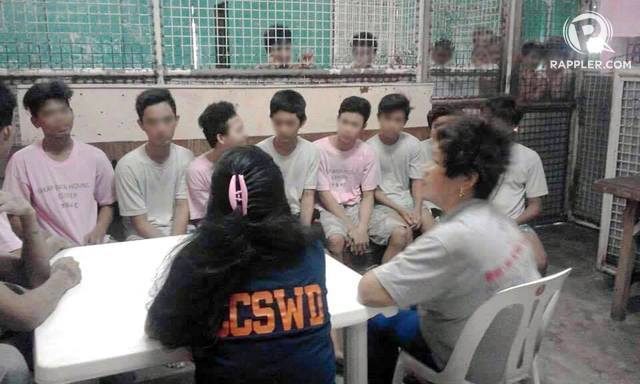SUMMARY
This is AI generated summarization, which may have errors. For context, always refer to the full article.

MANILA, Philippines – Minority lawmakers are against the House bill lowering the minimum age of criminal responsibility, arguing that children are being used as “scapegoats” for the government’s failure to address crime.
Minority Leader Danilo Suarez, Senior Deputy Minority Leader Lito Atienza, and AKO Bicol Representative Alfredo Garbin Jr are all against House Bill (HB) 8858, which seeks to lower the criminal liability age from 15 years old to 9 years old.
“[It’s] very clear: we are looking for a scapegoat for an alibi for failure. Pumapalpak tayo sa ating (We are failing in our) peace and order campaign. So instead of addressing the real issues – police corruption, police inefficiency, lack of enforcement effectivity, the criminal justice system is defective and also corrupt – eh bakit ‘yong mga bata ang bibigyan natin ng sisi? (why are we putting the blame on the children?)” asked Atienza in a press conference on Wednesday, January 23.
Atienza said he could not understand why his colleagues are pushing for the bill, which is now being deliberated upon at the plenary. (READ: House panel OKs bill to lower age of criminal liability to 9 years old)
The Buhay representative said the government had failed to properly implement the amended Juvenile Justice and Welfare Act of 2006, which retains the minimum age of criminal liability at 15 but allows children as young as 12 to be detained in youth care facilities or Bahay Pag-asa only for serious crimes, such as rape, murder, and homicide, among others.
He pointed to the dismal conditions of these youth reformation centers. Suarez, Quezon 3rd district representative, agreed with Atienza. (READ: When ‘Houses of Hope’ fail children in conflict with the law)
“Sa ibang bansa kasi, may mga shelter sila doon sa mga juvenile, na may pinag-aaral, may social orientation, rehab program. Tayo wala. So how can we even think of implementing this law?” said Suarez.
(In other countries, their shelters allow juvenile delinquents to study as well as take social orientation seminars and rehabilitation programs. We don’t have that. So how can we even think of implementing this law?)
‘Cage of violence, drugs, criminality’
Garbin argued that studies have shown that children in conflict with the law often come from broken families or grew up in communities with a high level of criminality and drug abuse.
This means that without proper intervention from the government, these children are prone to grow up mimicking what they see in their community. (READ: Beyond juvenile delinquency: Why children break the law)
“So makita ho natin dito ‘yong well-being ba ng bata ay maa-address ba natin by coming up with a new law? Or is it because we are not addressing the true social ills of our society?” asked Garbin.
(So will we be able to ensure the well-being of the child by coming up with a new law? Or is it because we are not addressing the true social ills of our society?)
“Dahil ‘pag ‘di mo inalis sa isang sitwasyon ang isang bata doon sa hawla kung saan ‘yong hawla na ’yon ay hawla ng [karahasan], hawla ng drugs, ng criminality, of neglect, of abandonment, kahit ano hong batas na gagawin natin dito, ipapasa natin sa Kongreso, magagamit at magagamit sila sa kriminalidad,” said Garbin.
(Because if you do not remove the child from a situation, from a cage of violence, drugs, criminality, neglect, and abandonment, no matter what kind of law we pass here in Congress, they would still be used to commit crimes.)
The House minority’s concerns about HB 8858 are the same as that of Akbayan Representative Tom Villarin and Bukidnon 3rd District Representative Manuel Zubiri.
Villarin and Zubiri questioned HB 8858’s sponsor and House committee on justice chairperson Salvador Leachon over the same issue during the session on Tuesday, January 22.
Leachon defended the bill, saying the lack of implementation of the existing law is the reason why the House is pushing for HB 8858, as it would ensure funds for the Bahay Pag-asa and transfer jurisdiction over it to the Department of Social Welfare and Development. – Rappler.com
Add a comment
How does this make you feel?
There are no comments yet. Add your comment to start the conversation.